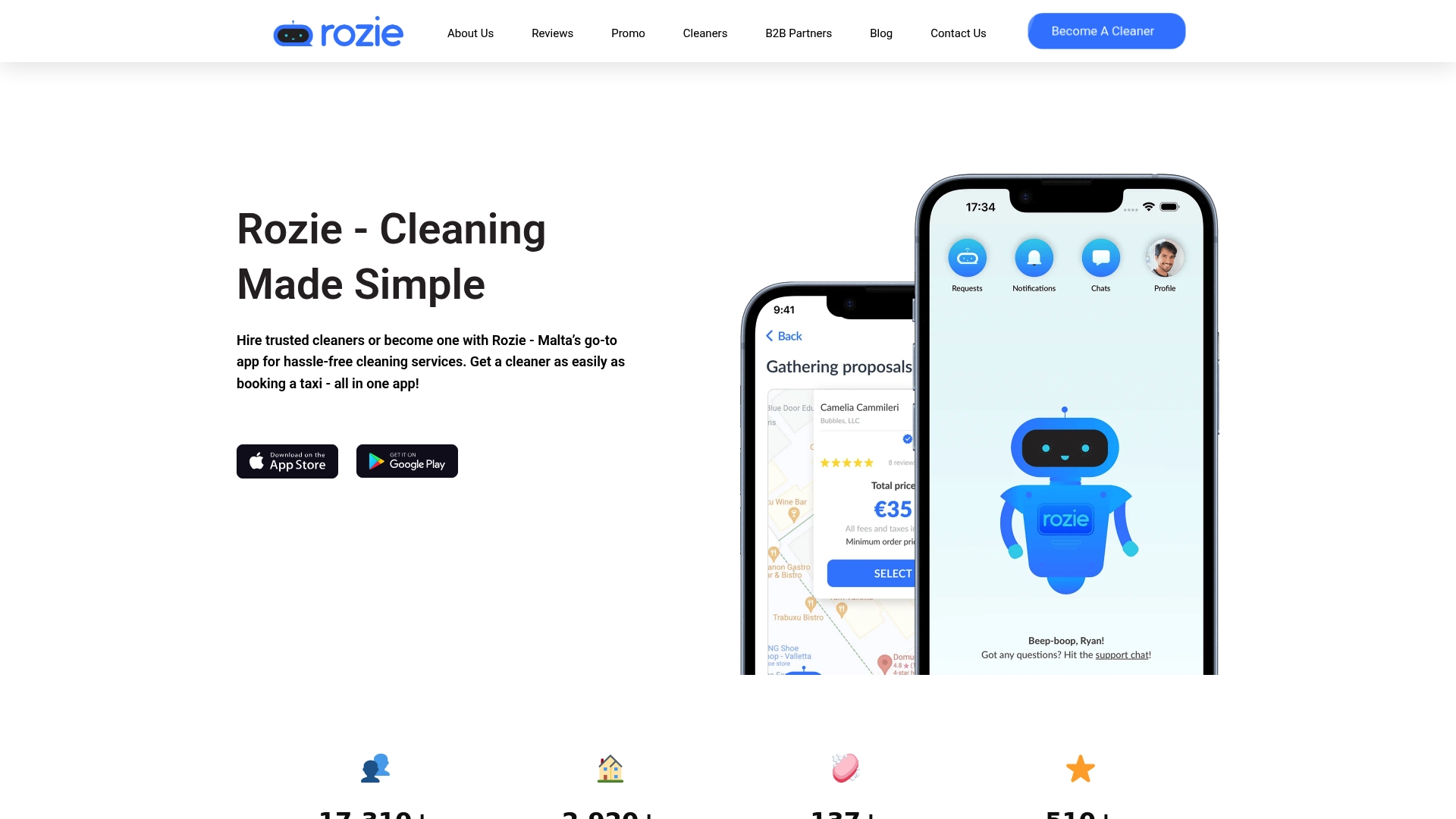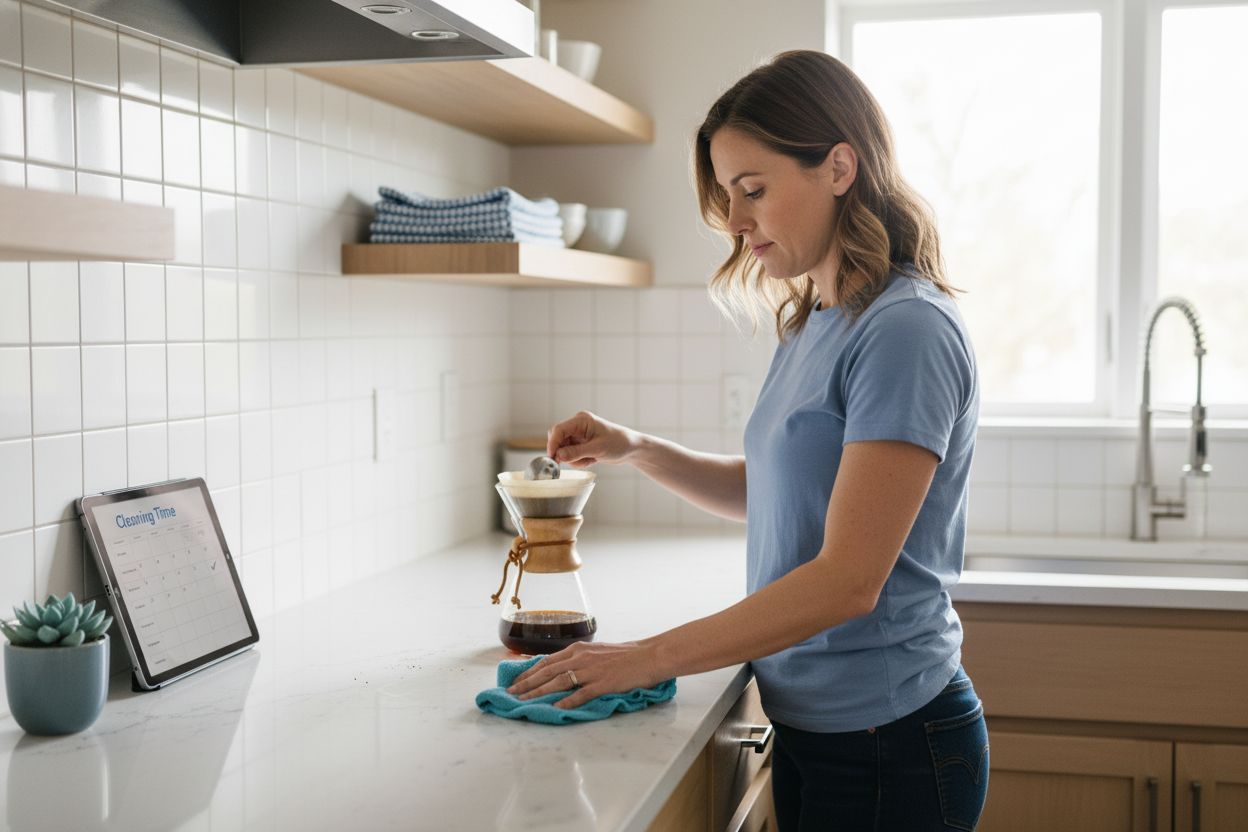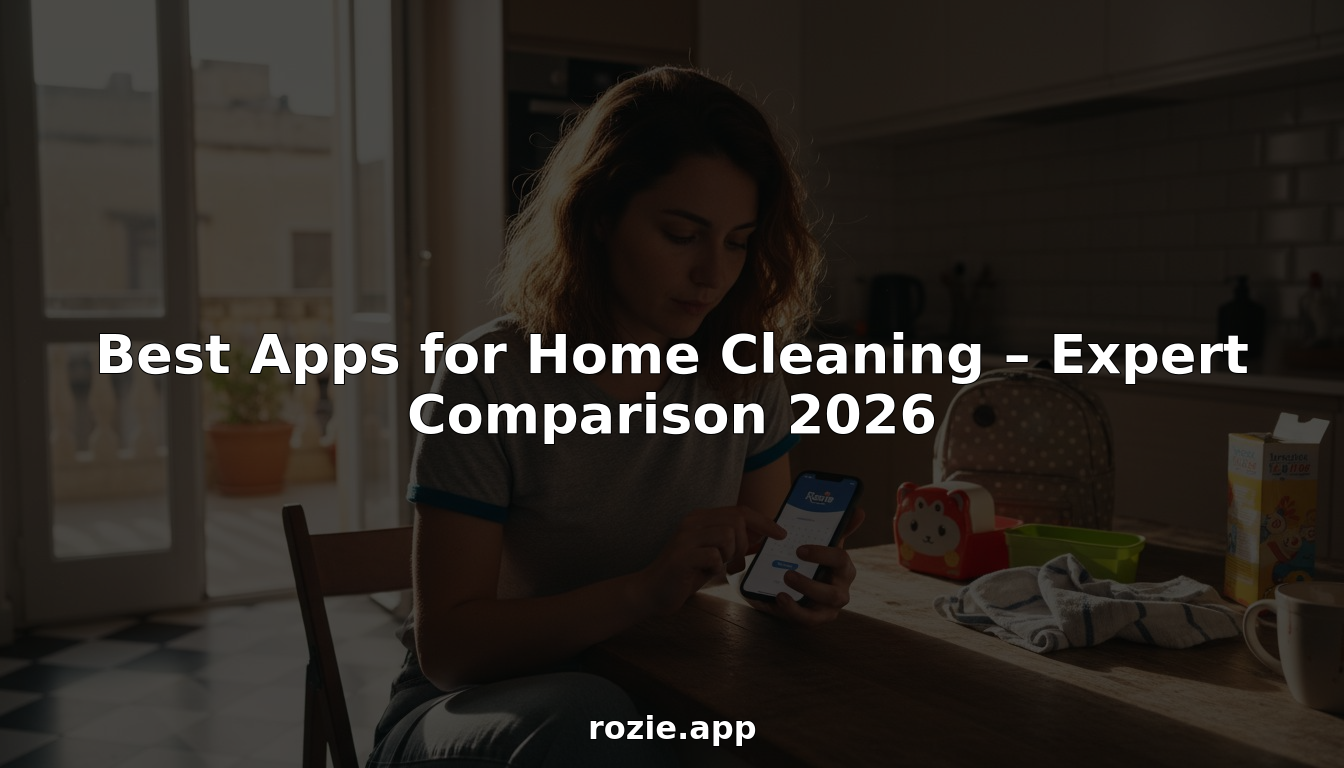Cleaning can eat up hours every week for busy people and research shows that strategic cleaning can help reclaim over 60 hours of free time a year. Most think a spotless house demands endless scrubbing and rigid schedules. The wild part is that effective cleaning time management is actually about working less and getting better results, even for those with a packed calendar.
Table of Contents
- What Is Cleaning Time Management?
- The Importance Of Effective Cleaning Time Management
- Key Concepts In Cleaning Time Management
- How Cleaning Time Management Works In Daily Life
- Practical Applications Of Cleaning Time Management
Quick Summary
| Takeaway | Explanation |
|---|---|
| Prioritize cleaning tasks effectively | Focus on urgent and important tasks to manage time better. |
| Create a flexible cleaning schedule | Develop a plan that adapts to your lifestyle and commitments. |
| Adopt micro-cleaning strategies | Integrate small cleaning tasks into daily routines to prevent overwhelm. |
| Utilize technology for organization | Leverage apps and digital tools to streamline and track cleaning activities. |
| Customize your cleaning workflow | Tailor cleaning methods to fit your personal preferences and energy levels. |
What is Cleaning Time Management?
Cleaning time management is a strategic approach to organizing and executing household cleaning tasks efficiently, transforming how busy individuals handle their domestic responsibilities. According to professional cleaning research, it involves systematically planning, prioritizing, and executing cleaning activities to maximize productivity and minimize time spent on household maintenance.
The Core Principles of Cleaning Time Management
At its essence, cleaning time management is about working smarter, not harder. This approach recognizes that cleaning is not just about completing tasks but doing so in a manner that fits seamlessly into your lifestyle. Key principles include:
- Prioritizing tasks based on urgency and importance
- Creating structured yet flexible cleaning schedules
- Utilizing efficient cleaning techniques and tools
Professionals understand that effective cleaning time management goes beyond simple task completion. It requires a holistic understanding of personal schedules, living spaces, and individual cleaning preferences. Learn more about creating an effective household cleaning planner to streamline your approach.
Below is a table summarizing the core principles of cleaning time management, organizing each principle with a concise explanation to help clarify their distinct focus and utility.
| Core Principle | Description |
|---|---|
| Prioritization | Focuses on identifying and addressing cleaning tasks based on urgency and importance for greater efficiency. |
| Structured Yet Flexible Scheduling | Involves creating cleaning plans that provide structure but can adapt to changing routines and commitments. |
| Efficient Techniques and Tools | Utilizes time-saving cleaning methods and tools to improve results while reducing effort. |
| Holistic Approach | Considers personal schedules, living spaces, and preferences to create a realistic, sustainable cleaning system. |
Benefits of Implementing Cleaning Time Management
Implementing a systematic approach to cleaning offers numerous advantages for busy professionals and households. By strategically organizing cleaning activities, individuals can:
- Reduce overall stress related to household maintenance
- Create more free time for personal and professional pursuits
- Maintain a consistently clean and organized living environment
- Prevent the buildup of overwhelming cleaning tasks
Cleaning time management is not about perfection but about creating sustainable, realistic cleaning practices that adapt to your unique lifestyle and time constraints. Whether you are a working professional, a parent, or someone with a packed schedule, developing a structured approach to cleaning can significantly improve your quality of life and reduce domestic stress.
The Importance of Effective Cleaning Time Management
Effective cleaning time management is more than a household organizational strategy it is a critical skill for maintaining personal well-being and productivity in our increasingly complex modern lives. Research from productivity experts reveals that individuals who implement structured cleaning approaches can reclaim significant amounts of personal time and reduce stress levels.
Psychological and Mental Health Benefits
The psychological impact of effective cleaning time management extends far beyond simple task completion. A well-organized cleaning approach directly influences mental clarity and emotional well-being. Cluttered environments can create subconscious stress, increasing anxiety and reducing overall productivity. By implementing systematic cleaning strategies, individuals create spaces that promote mental calmness and psychological resilience.
Key mental health benefits include:
- Reducing cognitive load associated with household maintenance
- Creating predictable and manageable cleaning routines
- Minimizing decision fatigue related to household tasks
Discover an effortless weekly cleaning routine designed for busy professionals that can transform your approach to household management.
Economic and Time Efficiency Implications
Beyond psychological benefits, effective cleaning time management offers substantial economic advantages. By optimizing cleaning processes, individuals can significantly reduce time spent on household maintenance. Strategic cleaning approaches can save hours each week, translating into increased productivity in professional and personal domains.
Economic benefits encompass:
- Reduced time investment in cleaning activities
- Lower likelihood of requiring professional cleaning services
- Preservation of personal and professional resources
Ultimately, cleaning time management is about creating sustainable lifestyle practices that harmonize personal responsibilities with individual goals. It represents a sophisticated approach to domestic life management, enabling individuals to maintain clean, organized spaces without sacrificing valuable time and energy.
Key Concepts in Cleaning Time Management
According to systematic productivity research, cleaning time management is built upon several foundational concepts that transform household maintenance from a chaotic experience into a structured, efficient process. Understanding these core principles enables individuals to develop more effective and sustainable cleaning strategies.
Prioritization and Task Categorization
Task prioritization is the cornerstone of effective cleaning time management. Not all cleaning activities carry equal importance or urgency. Intelligent task categorization involves distinguishing between critical maintenance tasks and optional cleaning activities. This approach allows individuals to focus energy on areas that significantly impact living space quality and personal well-being.
Key prioritization strategies include:
- Identifying high-traffic areas requiring frequent attention
- Distinguishing between daily, weekly, and monthly cleaning requirements

- Creating a hierarchical cleaning framework based on individual lifestyle needs
Learn about the latest cleaning trends and innovative management techniques that can revolutionize your approach.
The table below breaks down different categories of cleaning tasks by their typical frequency and importance, making it easy to see how prioritization and scheduling can be aligned for better time management.
| Cleaning Task Category | Typical Frequency | Importance Level | Example Areas/Tasks |
|---|---|---|---|
| Daily | Every Day | High | Dishes, wiping countertops |
| Weekly | Once a Week | Medium | Vacuuming, bathroom cleaning |
| Monthly | Once a Month | Low to Medium | Deep-cleaning appliances, baseboards |
| As Needed | Variable | Varies | Paperwork sorting, decluttering |
Systematic Scheduling and Time Allocation
Systematic scheduling transforms cleaning from a sporadic activity into a predictable, manageable process. Effective time allocation means breaking down comprehensive cleaning tasks into manageable segments that integrate seamlessly with personal and professional commitments.
Critical scheduling principles encompass:
- Creating realistic and flexible cleaning timelines
- Allocating specific time blocks for different cleaning activities
- Developing consistent routines that minimize mental resistance
Ultimately, cleaning time management is about developing a personalized system that respects individual constraints while maintaining a clean, organized living environment. By understanding and implementing these key concepts, individuals can transform cleaning from a stressful obligation into a structured, efficient practice that enhances overall quality of life.
How Cleaning Time Management Works in Daily Life
According to cleaning and productivity research, effective cleaning time management is not about executing massive cleaning operations but integrating small, strategic actions into everyday routines. This approach transforms cleaning from an overwhelming task into a seamless part of daily living.
Micro-Cleaning Strategies
Micro-cleaning represents the foundational principle of practical cleaning time management. Instead of waiting for tasks to accumulate, individuals proactively address small cleaning needs throughout the day. These brief, intentional actions prevent overwhelming buildup and maintain consistent household cleanliness.
Effective micro-cleaning techniques include:
- Immediately washing dishes after meals
- Spending 5 minutes tidying living spaces before bedtime
- Wiping surfaces after use
- Handling mail and paperwork as soon as they arrive
Explore our comprehensive house cleaning schedule for daily, weekly, and monthly maintenance to streamline your approach.
Integration with Personal Workflows
Successful cleaning time management requires seamless integration with individual lifestyle patterns. This means designing cleaning strategies that complement personal schedules, work commitments, and energy levels. The goal is creating a flexible system that adapts to changing life circumstances without causing additional stress.
Key workflow integration principles encompass:
- Aligning cleaning tasks with natural energy rhythms
- Utilizing transitional moments for quick cleaning actions
- Creating personalized cleaning triggers linked to existing habits
Ultimately, cleaning time management in daily life is about developing a personalized, sustainable approach that transforms cleaning from a dreaded chore into an effortless, almost unconscious practice. By understanding and implementing these strategies, individuals can maintain clean, organized spaces without feeling overwhelmed or sacrificing valuable personal time.
Practical Applications of Cleaning Time Management
According to productivity research, practical cleaning time management transcends theoretical concepts, offering tangible strategies that transform household maintenance into an efficient, stress-reducing process. The real power lies in translating knowledge into actionable, sustainable practices.
Technology and Digital Tools Integration
Digital solutions have revolutionized cleaning time management, providing unprecedented opportunities for organization and tracking. Modern technology offers intelligent platforms that help individuals streamline their cleaning routines, track progress, and maintain accountability.
Digital tools for cleaning management include:
- Mobile apps with cleaning task schedulers
- Digital checklists with reminder systems
- Time-tracking applications for cleaning activities
- Cloud-based shared household cleaning platforms
Explore the transformative role of cleaning apps in daily life management and discover innovative technological solutions.
Personalized Cleaning Workflow Customization
Effective cleaning time management demands personalized workflow design. This approach recognizes that cleaning strategies are not one-size-fits-all but must be tailored to individual lifestyles, living spaces, and personal energy levels.
Key customization strategies encompass:
- Analyzing personal schedule and energy patterns
- Creating cleaning routines matching individual preferences
- Developing flexible systems adaptable to changing life circumstances
- Implementing modular cleaning approaches
Ultimately, practical cleaning time management is about creating a dynamic, responsive system that evolves with your life.
 By combining technological tools, personalized strategies, and consistent implementation, individuals can transform cleaning from a overwhelming task to a seamless, almost unconscious part of daily living.
By combining technological tools, personalized strategies, and consistent implementation, individuals can transform cleaning from a overwhelming task to a seamless, almost unconscious part of daily living.
Make Cleaning Time Management Effortless with Rozie
Struggling to keep up with cleaning despite prioritizing and scheduling tasks as the article describes? If you feel overwhelmed by daily mess or find that your carefully planned routines keep slipping, it may be time for a smarter solution tailored for real life in Malta. Discover how Rozie – Malta’s Best Cleaning Services connects you with verified cleaners and companies, vetted for trust and reliability, so you never have to worry about household chaos derailing your week again.

Save your time, reduce stress, and enjoy a consistently clean home without adding more to your to-do list. Book a trusted professional in minutes with Rozie.app and experience truly seamless cleaning time management. Ready to reclaim your schedule? Visit Rozie today or explore more practical tips on our blog.
Frequently Asked Questions
What are the key principles of cleaning time management?
Cleaning time management revolves around prioritizing tasks based on urgency and importance, creating structured yet flexible cleaning schedules, and utilizing efficient cleaning techniques and tools.
How can effective cleaning time management reduce stress?
Effective cleaning time management can reduce stress by minimizing the overwhelming feeling that comes from clutter and disorganization, allowing for more free time and a consistently clean living environment.
What are micro-cleaning strategies and how do they work?
Micro-cleaning strategies involve addressing small cleaning tasks throughout the day to prevent overwhelming accumulation. Examples include washing dishes immediately after meals, tidying living spaces for a few minutes before bed, and wiping down surfaces after use.
How can digital tools assist with cleaning time management?
Digital tools like mobile apps can help manage cleaning schedules, track progress, and maintain accountability by providing features such as task reminders and progress checklists.
Recommended
- 7 Essential Tips for Your Household Cleaning Planner | Rozie – Malta’s Best Cleaning Services
- Effortless Weekly Cleaning Routine for Busy Professionals | Rozie – Malta’s Best Cleaning Services
- Clean Home, Clear Mind: The Mental Health Case for Outsourcing Chores | Rozie – Malta’s Best Cleaning Services
- The Cleaning Craze: Everyone’s Suddenly Talking About Cleaning



